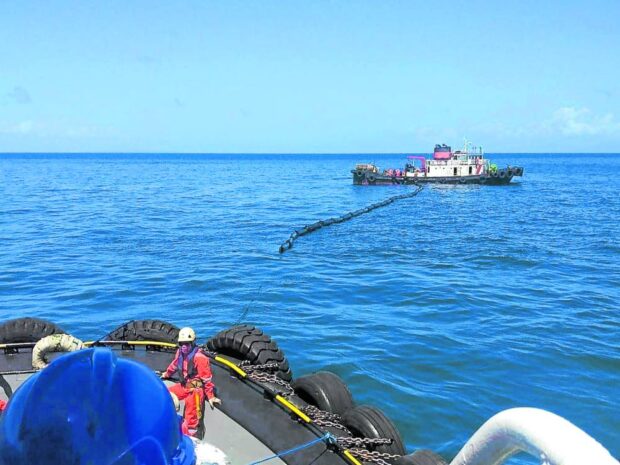Gov’t failures bared in Mindoro oil spill

CONTAINMENT AND RECOVERY | In this photo taken on March 9, 2023, Philippine Coast Guard personnel place an oil spill boom in the waters off Naujan, Oriental Mindoro, where a fuel tanker sank on Feb. 28. The operation is part of containment and recovery efforts to prevent oil slick from reaching a wider area in the coastlines of at least three provinces. (Photo from the Philippine Coast Guard)
MANILA, Philippines — Senators on Tuesday expressed concern over the lack of a coordinated disaster response to contain the Feb. 28 oil spill off Oriental Mindoro, which has already spread to coastal areas in three provinces and deprived thousands of fisherfolk of their livelihood.
At the start of its inquiry into the maritime disaster on Tuesday, the Senate committee on environment confirmed that the sunken tanker MT Princess Empress, which is feared to spill up to 800,000 liters of industrial-grade oil into the sea, did not have the required government permit to be allowed to sail out to sea.
Citing the complaint of Oriental Mindoro Gov. Humerlito Dolor, Senate President Pro Tempore Loren Legarda noted that no single official had been directing the national government’s disaster response on concerns like containing the oil spill and mitigating its impact on the environment and the livelihood of the affected communities.
“We heard Governor Dolor talk about how they (in the local governments) have been confused because they do not know who was in charge. Government efforts cannot be piecemeal, that every now then, local governments have to wail and beg for assistance,” she said.
“I understand the frustration and confusion; (the local governments) are looking for someone who will take the lead,” Legarda added.
Article continues after this advertisementIn response, Sen. Cynthia Villar, who was presiding over the hearing, said the committee would request President Marcos to designate an official to lead the government’s response to the impact of the spill.
Article continues after this advertisementThe probe was prompted by Senate Resolution Nos. 537 and 538, and the March 6 privilege speech delivered by Sen. Francis Tolentino.
Cleanup
According to the Office of Civil Defense, the oil spill has already affected more than 108,000 people in 118 villages in the provinces of Oriental Mindoro and Palawan.
Environment Secretary Maria Antonia Yulo-Loyzaga said the Department of Environment and Natural Resources (DENR) was looking at a “worst case scenario” in dealing with the spill, with a cleanup that could last for weeks and could render the waters unsafe for fishing for about five months.
“Our assumption is that we will not be able to stop the seepage and that we will act if we are [in] the worst-case scenario in order to present our needs assessment in our collaboration with the rest of the stakeholders,” she told senators.

INQUIRY | Environment Secretary Maria Antonia Yulo-Loyzaga (bottom right) and other officials on Monday, March 13, 2023, faced senators during an inquiry into the Feb. 28, 2023, oil spill off Oriental Mindoro. (Photo by RICHARD A. REYES / Philippine Daily Inquirer)
Dolor complained that the Philippine Coast Guard (PCG) was quick to file for insurance claims from the P63-million coverage for its own cleanup operations, while the provincial government was struggling to source relief funds for its displaced residents.
“It pains me to hear that while our government is confused about the response, our people in Oriental Mindoro get to bear all the sufferings. You let the vessel sail even without a CPC (certificate of public convenience), and here you are, claiming the funds for your own operations and taking for granted the needs of our own people. Is that even humane?” Dolor said.
Assistance
Sen. Raffy Tulfo pressed the shipowner to shell out funds for the immediate assistance of displaced fisherfolk, as he expressed concern that the government’s cash-for-work might take a while before it could provide relief to affected communities.
“I am told that before, you were hiding from concerned parties. What you should be doing instead is to work closely with (local governments),” he told Fritzee Tee, vice president of RDC Reield Marine Services, the ship’s owner.
In Oriental Mindoro, Pola Mayor Jennifer Cruz had given the vessel owner 10 days “to make residents feel their direct support” or face a legal battle.
Cruz said residents of 11 coastal villages of Pola, the worst-hit town by the oil slick, were struggling to survive as they needed to abandon their livelihood due to a fishing ban.
The mayor said she “cannot wait long for the promised compensation of the owner of the oil tanker,” citing her obligation to protect the rights of her constituents.
Tulfo said the proceeds of RDC’s indemnity insurance for MT Princess Empress might also be used to provide for livelihood assistance for residents.
Villar, however, expressed doubt that RDC would be able to collect insurance claims after Marina confirmed that MT Princess Empress had not been listed in the company’s CPC, which is a form of license.